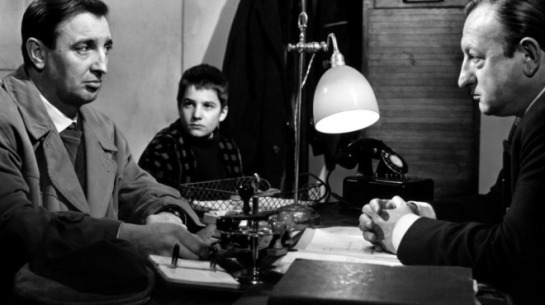Francois Truffaut heads the list of great directors whose work I’m fairly unfamiliar with. Truffaut was an esteemed French filmmaker who was also a father to the French New Wave of the late 1950’s and 1960’s. He was deeply critical of the state of French cinema in the mid-50’s and eventually begin to make films of his own. His first feature-length picture came in 1959 with “The 400 Blows”. This is my launching point into the films of Truffaut and what a wonderful way to start. “The 400 Blows” is a gripping and deeply penetrating picture that instantly grabbed me with its heartfelt realism and its crisp visual style. And judging by this, his initial effort, there’s a clear reason why Truffaut is heralded as one of the most influential filmmakers in cinema history.
“The 400 Blows” follows 12-year old Antoine (played wonderfully by Jean-Pierre Leaud) and his life in 1950’s Paris. At first Antoine comes across as unruly and rebellious. But as the story unfolds we see that he is inundated with negative influences. His father is a forceful and sometimes pernicious authoritarian who takes the frustrations from his life out on his son. His abusive temper shows itself physically and verbally even to the point of publically humiliating his son . His mother is even more unhappy and discontent and she lets it show through her emotional negligence and general disinterest in her son. It’s only after Antoine catches her in an affair that she begins to show affection for him but even that is grounded in her own arrogant self-interest. Even at school Antoine faces his teacher whose meanness is based on his assumptive judgements that Antoine is and forever will be a bad kid.
Antoine finds refuge on the streets of Paris and in the company of his best friend Rene (Patrick Auffay). Rene is a mischievous type and it’s uncertain whether he’s the best influence either. But the two have a true friendship which Antoine depends on. Some of the movies best scenes are with these two friends walking the streets of Paris talking back and forth. As things break down at home and at school, Antoine sees the streets as his only out and it’s Rene who’s there to help him survive, although not always in the most wise of ways.
At its core, this is really a heartbreaking story. It’s a perfect example of a young boy being a product of his environment yet fighting hard not to be. Those who should be the stable, influential forces in his life utterly fail him. Even the law enforcement system heartlessly mistreat him later in the film. But Antoine just wants to be a little boy. We get to see the childlike yearnings for a stable home with a loving mother and father.
There’s a scene where Antoine is at home alone with his father and they are preparing dinner. It’s one of the few instances where his father is being a father. Truffaut elegantly shows Antoine’s love for this father-son moment through the young boys gazes and expressions. There is also another scene where the family goes out to see a movie together. For these few moments we see the happy family that Antoine wants and needs. Sadly, these are anomalies – exceptions to an otherwise dismal life for the 12-year old.
“The 400 Blows” is a powerful movie that will take you through a wide range of emotion. We experience the playfulness and cruelty of life along with the young boy. Before long, we’re rooting for him yet we’re uncertain of what the future holds right up to the last shot. It’s truly a magnificent film that put Truffaut on the map and I can certainly see why it remains influential to this day. It’s gorgeously crafted, deeply moving, and features penetrating performances. Enough with the adjectives. Let’s just say I loved “The 400 Blows” and I can’t wait to dive into more of Truffaut’s work.
VERDICT – 5 STARS






I thought it was a good movie, but I really didn’t love it and feel the need to rewatch it. But that seems to be the case with more classic French movies.
I was really moved by many components of the movie. It made me laugh and also feel uncomfortable as well. I also loved the visual style. I’m anxious to see it again.
Thanks for the comment. I was hoping others have seen this and would share their thoughts.
Fantastic review, Keith.
Thanks! It’s a wonderful film.
That title would work great on a porn film haha 😀
I’ve thought about this movie about once a day since I watched it. I can’t shake it.
It sticks with you. That a great way of thinking about this movie. It really is that effective!
This was the film that made me realise that studying the French New Wave in Film Studies was not going to be boring. Loved it and still love it. Such a simple story beautifully told.
Yes! It it packs a real emotional punch. Plus it’s so brilliantly filmed. Loved it. Was wondering how many others had seen this picture.